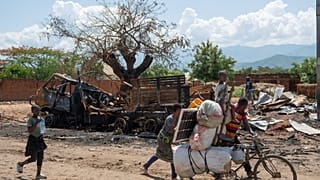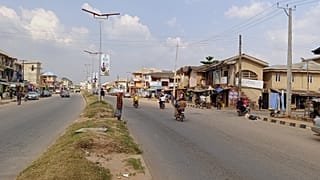Nigeria
About 500 people are believed to have died in Nigeria's worst flooding in a decade with a further 1.4 million people displaced from their homes.
The heavy downfalls have hit huge swathes of the country and affected people from all walks of life.
Jude Ekene-Ane is a moto-taxi driver whose business has been badly damaged by the situation
"As a keke [moto-taxi] driver it has affected us," he explains. "It has affected us very very much. Affected me the most especially, because people are no longer living in this area, people have migrated to other places.
"We no longer see passengers carry. It's only these canoe people that are the ones doing the shuttle services. We don't have anything like keke or bus or other vehicles that we'd normally use for transportation."
Floods caused by abundant rains and poor infrastructure have affected vast swathes of the country sparking fears of food shortages and high inflation.
Fuel scarcity has already caused long queues at petrol stations in the capital Abuja this week after tankers were blocked by floods in neighbouring states.
Jude said: "Together with our [neighbours] we paid for over five trips of sand that we would drop along these streets and in front of our yard to stop the flood from entering our house.
"But all to no avail. The whole effort was abortive, it couldn't work because the flood is too much."
Even more heavy rain is expected in the coming weeks and months.
The rainy season typically ends in November in northern states and in December in the south and more damage to people and property is likely before then.











Go to video
Coups in Africa 2025: Power shifts, failed takeovers and political instability
00:42
Anthony Joshua hospitalised after fatal car crash in Nigeria
02:01
UN Chief urges world leaders to choose peace over war in new year message
03:00
AFCON 2025: Morocco cruise through as knockout picture takes shape (Football Now)
01:59
Nigeria aim for perfect group finish as Uganda chase AFCON survival
Go to video
Anthony Joshua involved in Nigeria road crash that kills two